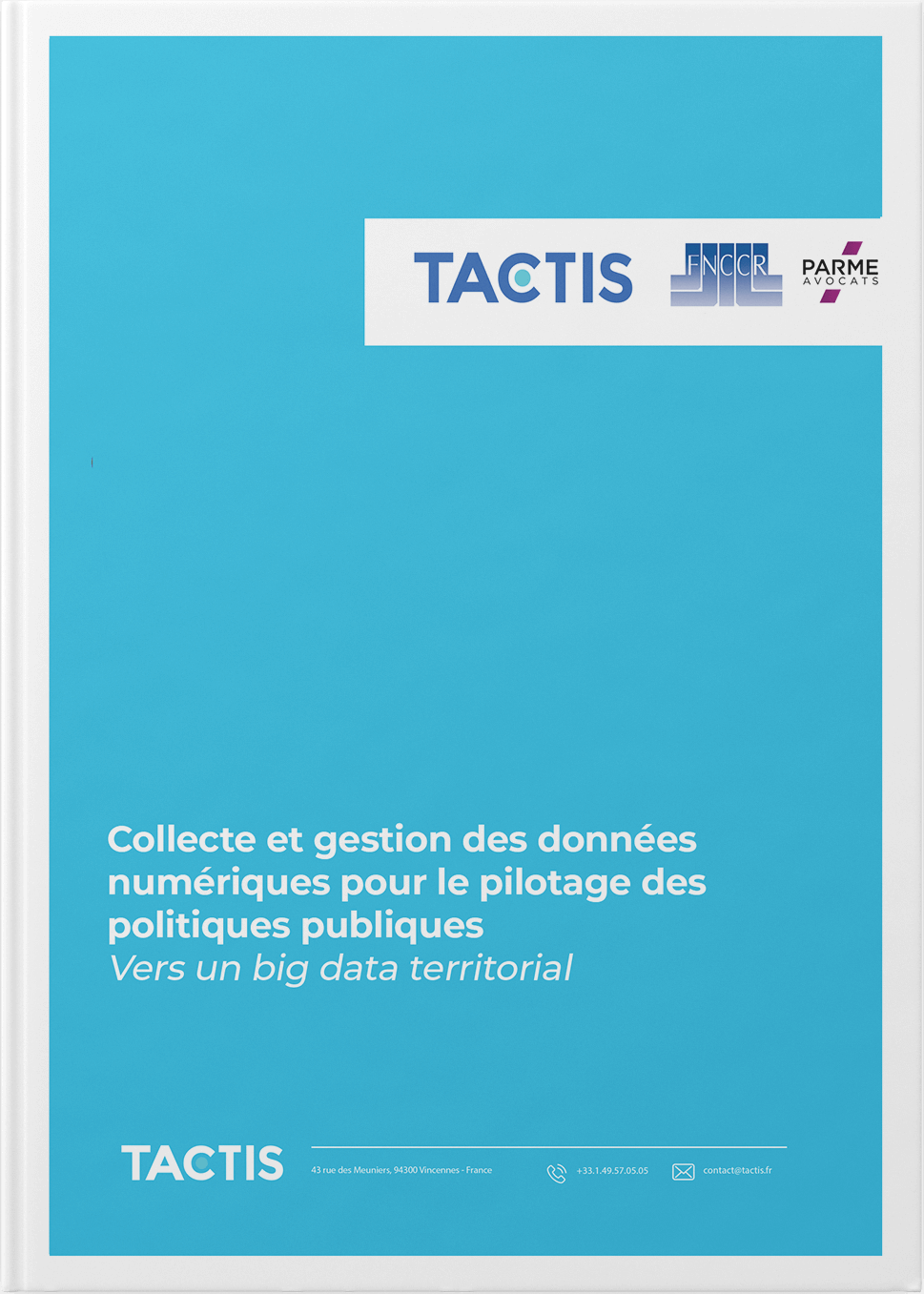Tactis Publication - Towards a territorial Big Data
Collection and management of digital data for the management of public policies
Download this 160-page document to benefit from a comprehensive approach to the evolution towards territorial big data.

Faced with the spread of digital technology in networks (energy, mobility, etc.) and the production of data by citizens, the question of the role of local authorities in relation to data is raised
Digital technology is a key element of regional transformation, and data is becoming a new challenge at the heart of relationships between communities, local stakeholders, and citizens.
Access to data is becoming crucial for a region: – Improving knowledge of the territory – Strengthening control over public service missions – Contributing to regional planning and better management – Developing relationships (co-production) with users and citizens
- Digital technology enables a new relationship between citizens and their environment.
- Citizens are becoming key stakeholders in the region and contribute to data production, particularly through social media. Their role within the city and in decision-making and democratic processes must be recognized.
The study on the Collection and Management of Digital Data for Steering Public Policy highlights that the proliferation of "communicating objects" (>50 billion connected objects by 2020) is enabling a profound evolution of public services and contributing to the modernization of regional management.
This profusion of communication elements, coupled with the evolving role of citizens through social media, is creating a "data tsunami" (data volume multiplied by 30 between 2010 and 2020) but also enabling the development of new, more relevant information.
For local authorities, and in particular for public authorities (Transport/Mobility, Energy, etc.), this represents both a tremendous opportunity and a source of potential risks that must be anticipated.
Thus, the issue of data access, collection, management, and use are emerging as a new challenge to be integrated into a local government's public policies. This issue must be put into perspective for local and national public decision-makers.
The study on the Collection and Management of Digital Data for Steering Public Policy recommends the creation of a sustainable and favorable framework for the use of local public data, through five measures:
- 1. Establish a "local data" authority
- 2. Establish specific governance for territorial data management
- 3. Promote a neutral and interoperable technological framework
- 4. Take action to change regulations
- 5. Leverage funding provided by local authorities to require access to certain data
Discover below the introductory remarks of this 130-page study to download here:
In a globalized economy, gradually driven by digital technology, data is becoming an element of added value and wealth, both in terms of the volumes processed and the diversity of accessible data. Online exchange and communication flows are reaching levels that were still inconceivable a decade ago. And they are continuing to grow spectacularly, with the number of messages exchanged daily across the planet between 2013 and 2015 increasing from 100 billion to 150 billion...
This revolution in communication methods and transactional exchanges gives data a central role. The traces left by tens of millions of users, whether by visiting a website or making online purchases, are now captured and exploited by companies capable of extracting commercially useful behavioral information from them. This ability to massively read user needs, in order to provide a tailored service, has also given rise to disruptive innovations with dazzling success, leading to the decline of service activities previously considered stable and prosperous.
"Google knows more about France than INSEE," two researchers recently lamented, criticizing the rapid transformation of markets and the arrival of new players who control them. This stance was primarily intended to highlight France's growing loss of sovereignty over its data, thereby depriving it of the exploitation capacity that would provide competitive advantages.
Analytical sciences can indeed achieve feats. They reveal new, previously invisible trends or predict user behavior with increasing accuracy, thanks to "big data" processing. Like Google or Amazon, which provide numerous services to Internet users (search engines and browsers, purchasing and consultation services for cultural objects, etc.), some digital companies are now able to exploit data generated by Internet users on a global scale and convert it into competitive advantages. We no longer mention marketplaces like eBay, tourism-oriented services like Booking, TripAdvisor, Airbnb or mobility platforms like Uber... With unprecedented speed, they are supplanting old activities that are unable to adapt to new consumer expectations due to their fragmentation.
Our country is struggling to foster such digital champions, to the point where some analysts are pointing to a delay they already consider irreversible. Should we follow them in this form of decline? Not so sure, because the combination in France of the deployment of very high-speed Internet (VHIB), the explosion of connected objects, and the exponential growth of data produced by administrations and urban services could well represent a new "El Dorado."
Private companies were the first in France to embrace the big data shift, with the gradual use of massive data processing tools during the 2000s. The movement initially impacted telecoms, mass distribution, and finance, then spread to other, more unusual sectors, and today includes predictive maintenance, real-time malfunction detection, the analysis of disease risk factors by pharmaceutical companies, and the development of marketing strategies based on consumer behavioral analysis.
The more recent use of these same tools within public administrations covers purposes more focused on performance or citizen relationship management. These tools are beginning to manage peak hours in public spaces… The goal is to provide efficient, personalized services that are closer to the people.
These areas of action appear promising. However, they require an organization and structure that does not yet exist on a large scale. The transition to these new forms of data governance would require, for example, a closer partnership between large utility companies, equipped with data-centric information systems, and the administrations themselves committed to exploiting their digital assets. The challenge for local governments is to foster the creation of administrative and entrepreneurial ecosystems capable of exploiting the added value of the data made available to them via service platforms.
The recently enacted Digital Republic Act will place open data among the main levers for transforming public data policies, both at the state and local levels. While the reform does not cover all valuable data produced by administrations – some information, such as personal data, is not intended to be disseminated without constraints – it should already contribute significantly to the breaking down of barriers and better circulation of information.
The government plays a leading role in structuring these policies. For example, it is driving forms of public action more focused on collaboration and data exchange between administrations, with the implementation of strategic programs such as "Tell Us Once" for simplification or France Connect for digital identity management. In the same spirit, it is pursuing a strategy of opening up national databases and essential repositories for public and private stakeholders, such as the National Address Database (BAN) or the SIRENE file dedicated to data on French companies. The "Etalab" mission, created by decree on February 21, 2011, is responsible for implementing this ambitious policy, particularly through the dissemination of public data via a national portal.
Furthermore, in addition to making data available, the government is committed to deploying a platform strategy to network the large databases held by administrations. It thus lays the foundations of a new digital architecture based on interoperability based on programming interfaces (APIs)... The implementation of these devices aims to facilitate the reuse of data, therefore to simplify and stimulate the capacity for innovation and development of services, relying more heavily on user approaches.
Large local authorities are also committed to this transition. As data producers and managers, they are investing in analytical tools: decision-making dashboards, reporting tools, urban monitoring systems, open data platforms, and more. National reforms on inter-municipal cooperation and open data could even accelerate the merger of "city center/EPCI" information systems and their refocusing on the reuse, control, and dissemination of public data.
However, the implementation of such systems is still largely dependent on the size of public entities. Outside of large urban areas, the municipal bloc currently lacks either the capacity for action or the means to finance such "infostructures." However, open data legislation will lead them to this goal relatively quickly. Also, to support this development and prevent it from becoming too burdensome, clarification of the local governance framework, the issue of inter-administration exchanges and State/local authority relations will gradually have to be imposed in order to organize at different levels, a data service based on the collection, dissemination and shared exploitation of data. Take an interest in data sciences to optimize their spending, fight fraud more effectively, predict risks of fires or theft of property, practice behavioral analysis to better manage peak hours in public spaces... The objective is to provide efficient, personalized services that are closer to people.


